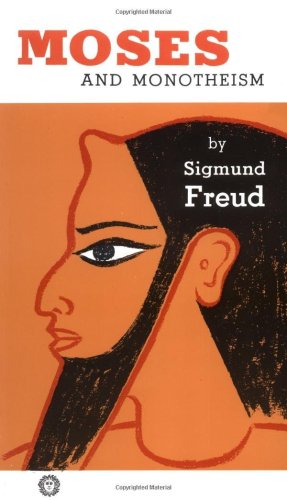Moses and Monotheism has been the first full-length book that I read by Sigmund Freud. While I did read a number of articles and excepts by Freud, I didn’t have the chance to read a complete work until now. There is a lot to be said about the man and his works, and indeed a lot has been said and debated.

Freud needs no introduction, or rather he often needs reintroduction. A very controversial and misunderstood person, if there ever was one. The father of psychoanalysis had much to say outside his prime interest and we’re lucky he published some of his more controversial materials. The reason I say this is very much evident in Moses and Monotheism.
The book is an easy read, even though it’s translated from German. The topic, however, is very controversial. In fact, I suspect it’s mostly because of his religious convictions and ideas related to religious figures and history that really condemned him to the evermore hatred of the masses. Even though I was acquainted with his pen and style, I was still very much amused and pleasantly surprised quite a number of times.
The book’s roots are in two articles Freud wrote for Imago, a scientific journal, back in the 1930’s. After escaping to England from invaded Poland, he was encouraged to publish the remaining text with the articles he had already written in a book binding. The idea is to try to analyse the psychology behind the different stories, laws and events written in the old testament. That is, the author is trying to reconstruct as much as possible what really could have happened to the Israelites in Egypt. There is a healthy doze of references to historians and other specialists which give more credit to his views.
Two reasons to really find this book very well worth the read. First and foremost, the author isn’t coy of calling out the limitations and issues with the ideas he puts forth. He’s quick to criticize himself. On so many occasions did he mention how problematic or limited some of his claims are and suggested what could be tested and what is pure guesswork. It’s always refreshing to read such sober and mature author.
Second, on a number of point he did make me pause to reflect on his explanations. I had to remind myself that this was the father of psychoanalysis after all, not a random author. Yet, I was still blown away by some of his points. Take for example a question that I spent countless hours contemplating without progress. Why do many (most?) people sympathize with figures, civilizations, lifestyle and virtually everything historic? That is, why is it almost universally accepted that there has been a great past that our ancestors enjoyed and everything is in constant decline and degeneration since? From people rejecting modern medicine in favor of “natural” and “traditional” medicine all the way to blaming modern cities and urbanization on all evils.
There is something about the past that is universally appealing. Reading Moses and Monotheism yielded a very reasonable explanation: we associate the past with our childhood, which is typically remembered as peaceful and blissful. Sounds like Freud, doesn’t it? He didn’t need to make a strong case for this explanation. Perhaps he or someone else already did that elsewhere, but as it stands, he gives something everyone can experience more or less.
While overall the book was a very good read, an almost complete century of progress in archaeology, history and psychology should have something to say about the then-untested hypotheses that the author puts forth, not to mention new evidence unknown at the time. And while none of these fields are even remotely close to mine, I could tell he’s probably already proven wrong on some of his educated guesses. Still, considering what he had to work from, he did a fascinating job overall. A thought provoking and insightful book.